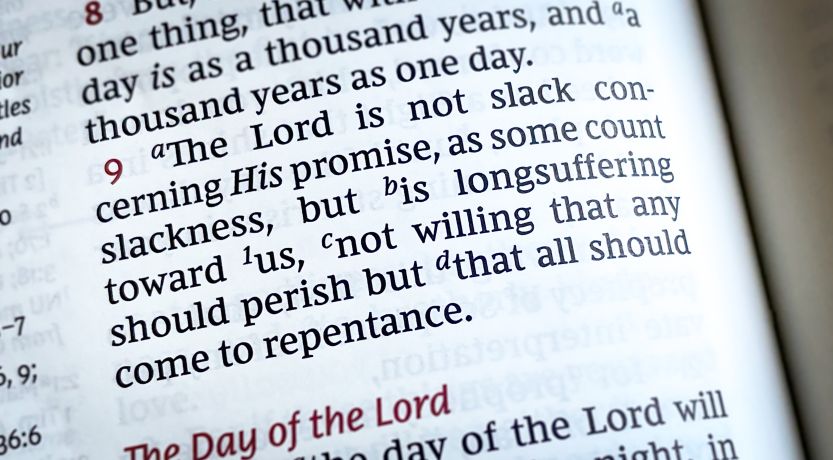The Meaning of 2 Peter 3:9: “The Lord Is Not Slack Concerning His Promise”?
The apostle Peter’s message in 2 Peter 3:9 is rich in comfort and encouragement, though it has sometimes been misunderstood. What does 2 Peter 3:9 mean?

What does 2 Peter 3:9 say?
"The Lord is not slack concerning His promise, as some count slackness, but is longsuffering toward us, not willing that any should perish but that all should come to repentance."
Christ’s second coming will begin a chain of events:
- The resurrection and transformation of the saints into glorious spirit beings.
- The imprisonment of Satan the devil.
- The administration of the Kingdom of God on earth, headquartered in Jerusalem.
As marvelous as these events will be in scope and impact, they are promises for the future. The dilemma for us today is that we don’t live in the future.
The world the first-century Church grew up in was also corrupt, perverted and brutal.
The everyday circumstances of those early Christians undoubtedly created an intense yearning for Christ’s return—the fulfillment of the promise, which they thought would happen in their lifetimes. (To learn more about this crucial biblical promise, see “Why, When and Where Will Christ Return to Earth?”)
So, when believers began to die off—whether by persecution, sickness or natural causes—people got discouraged.
With that in mind, Peter urged the brethren to remember, “The Lord is not slack concerning His promise, as some count slackness, but is longsuffering toward us, not willing that any should perish but that all should come to repentance.”
In 2 Peter 3:9 he presented several truths that need to be understood. Its meaning should have a tremendous impact on us today, just as it did on Christians 2,000 years ago.
So, what is the meaning of 2 Peter 3:9?
“The Lord is not slack concerning His promise, as some count slackness”
Other translations render this, “The Lord is not slow to fulfill his promise” (English Standard Version) or, “The Lord does not delay His promise” (Holman Christian Standard Bible).
The point is, God knows exactly when He will intervene in world affairs to prevent human beings from annihilating themselves. Human annihilation is exactly what would happen if Jesus Christ failed to rescue His creation (Matthew 24:22).
God does not change. He does not forget, and He does not lie.
God will reward His faithful servants. God the Father knows just what events need to take place before He shakes this earth in a way it has never been shaken before.
God does not change. He does not forget, and He does not lie.
Judging by the context of 2 Peter 3:9, it seems some in the Church had begun to lose sight of certain things.
The Church was being infiltrated by false ministers who were using various intelligent-sounding arguments to write off Christ’s return as something figurative, not literal. Influenced by Satan, these men were actively undermining the credibility of the real God, and it was powerfully affecting the brethren.
Peter predicted these scoffers would mock, “Where is the promise of His coming? For since the fathers fell asleep, all things continue as they were from the beginning of creation” (2 Peter 3:4).
In other words, do you really believe Christ will actually return? That’s a pipe dream!
To deal with their ensuing doubt, Peter wanted to “stir up” the brethren’s minds “by way of reminder,” which is why he decided to write his epistle in the first place (verse 1).
As helpful as Peter’s comments were to the brethren at that time, they also serve as a source of encouragement for us today.
Belief in God is plummeting and hostility toward biblical values is intensifying. Some today are tempted to abandon the faith altogether and buy into one of the many modern alternatives—from atheism to New Age ideas.
But Peter’s words still ring true: “The Lord is not slack concerning His promise.”
As the world flirts with destruction and calamity, the test of every Christian will be to remain faithful to what God has promised and to believe—really believe—that God will act on His promises. When we deeply understand that God “is not slack concerning His promise” (because He’s absolutely faithful to His promises), we will not get impatient and give up.
Jesus said, “Now when these things [tribulations and persecutions] begin to happen, look up and lift up your heads, because your redemption draws near” (Luke 21:28).
“But is longsuffering toward us, not willing that any should perish”
This scripture has been falsely applied to support the idea of universalism. Universalism is the belief that no one will perish because everyone will be saved.
But the idea of universal salvation contradicts a number of scriptures that undeniably prove the existence of free will and the fact that some will exercise their free will and ultimately reject God—which will result in their being thrown into the lake of fire.
So, back to Peter’s words in 2 Peter 3:9. What did he actually mean?
Correct interpretation begins with a proper understanding of context.
The reason it seems as if God is delaying is because He is merciful, providing ample opportunity for people to turn from their sin and obey God.
Peter was addressing how scoffers mock the idea of Jesus Christ’s return. They were essentially calling into question Jesus’ promise both to glorify His servants and to judge the earth.
Peter reminded the brethren that the doubters willfully forget about the sudden, sweeping judgment God sent on the earth in the form of a cataclysmic flood (verses 5-6).
In the same way, God has promised a future day of judgment for the earth—except this judgment will ultimately use fire, not water (verse 7).
Peter anticipated that the brethren would respond, “Why is God taking so long?”
The answer: Because God is longsuffering toward us and does not desire for anyone to perish.
The reason it seems as if God is delaying (though He isn’t) is because He is merciful, providing ample opportunity for people to turn from their sin and obey God. He is slowly bringing more and more children into His family.
He is patiently and methodically working out a long-term plan to bring more children into His family—on His timetable, not ours. Instead of being impatient because of His longsuffering, we should appreciate that aspect of His character and seek to develop it in our lives.
“But that all should come to repentance”
God’s intention for humanity has always been to bring “many sons to glory” (Hebrews 2:10). No human being can reach the end of that process unless he or she takes the crucial step of repentance.
The process of repentance begins when a person becomes fully aware that he or she has repeatedly trampled on God’s law—if not in the letter, then certainly in the spirit—and starts to see himself or herself for what he or she is—a sinner. This leads him or her to deeply desire to go to God for forgiveness. (To learn more about repentance, read “What Is Repentance?”)
God will ensure that everyone has a fair opportunity to receive His calling and respond to it.
But the repentant believer’s conviction—that he or she not only has done wrong but is wrong—comes from God. It is God’s goodness that draws (or calls) us and motivates us to repent (John 6:44; Romans 2:4). Repentance is a gift from God (Acts 11:18).
God initiates the process of repentance for each person individually, in His own time and according to His own schedule.
Under God’s inspiration, Paul confirmed, “For as in Adam all die, even so in Christ all shall be made alive. But each one in his own order” (1 Corinthians 15:22-23).
God has called a little flock into His Church now to do His work in this age (Luke 12:32). Later, He will open the door for all of mankind, an event pictured by the annual Feast of Tabernacles and the Last Great Day.
(For more information on the significance of these festivals and why Christians are required to keep them, read our booklet From Holidays to Holy Days: God’s Plan for You.)
As amazing as that may sound, especially considering the widespread belief that God is actively trying to save the whole world right now, it’s what the inspired Word of God says. God will ensure that everyone has a fair opportunity to receive His calling and respond to it. However, that doesn’t mean everyone will repent; some will grit their teeth and refuse.
But all will have an opportunity—and our hope is that ultimately the vast majority will repent and enter God’s family.
2 Peter 3:9 and you
God’s people have been waiting for Christ’s return for close to 2,000 years.
The hope of Christ’s return gives added impetus to our efforts to overcome sin, endure trials, and grow in grace and knowledge, even as we suffer from persecution and strive to do good to all.
If there were no promise, every Christian could throw in the towel because nothing would matter anymore (1 Corinthians 15:32). Without the promise of the Kingdom of God, what would be the point?
Thankfully, the return of Jesus Christ is as sure as the rising and setting of the sun.
Notice what Jesus said in Revelation 22:12: “Behold, I am coming quickly, and My reward is with Me, to give to every one according to His work.”
Every Christian’s commitment to overcoming and being steadfast should be coupled with the words of the apostle John:
“Amen. Even so, come, Lord Jesus!” (Revelation 22:20).
That is the encouraging meaning of 2 Peter 3:9!
Date Posted: August 24, 2022



